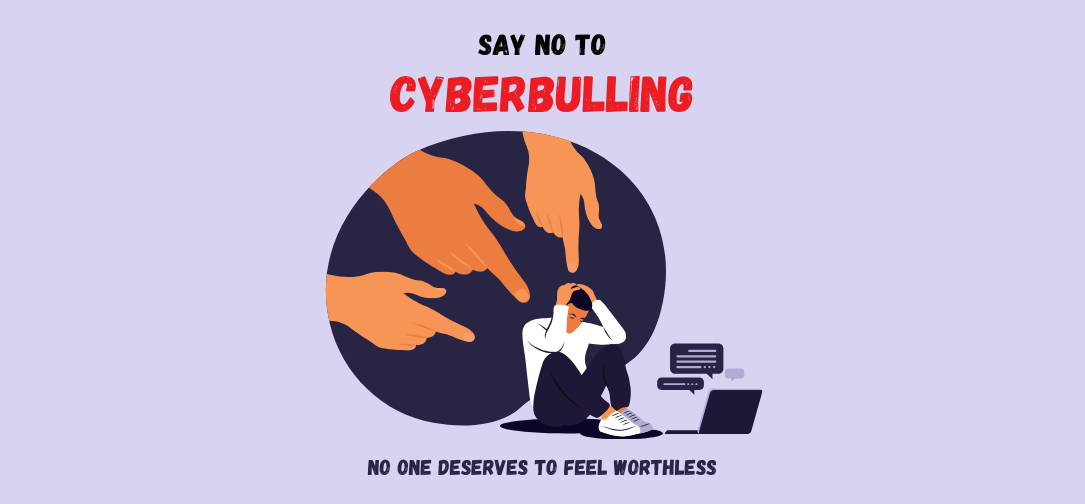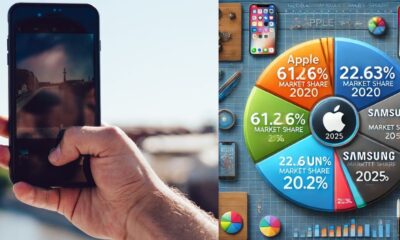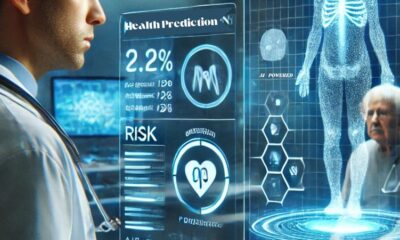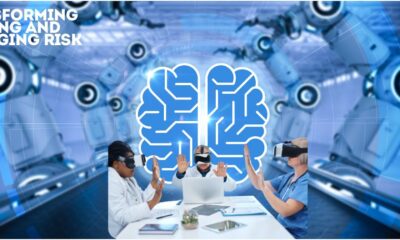Mental Health
Mental Health Disorders in the Digital Age: How Technology Is Impacting Our Minds
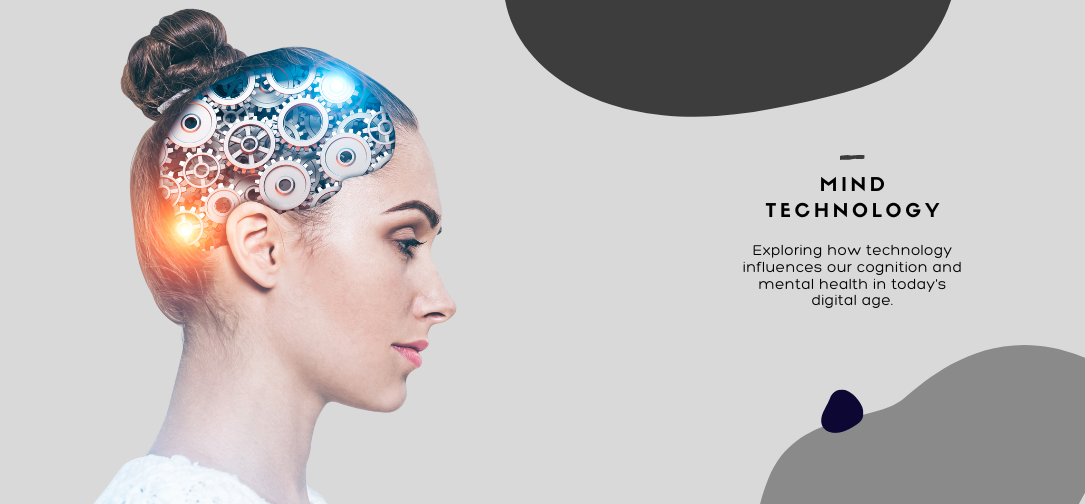
From the rise of social media to the increase in smartphone usage, technology has become an integral part of our daily lives. The 21st century has ushered in a digital revolution that has profoundly transformed the way we live, work, and interact. While these advancements have brought numerous benefits, they have also raised significant concerns about their impact on mental health. This article explores the complex relationship between technology and mental health disorders, examining both the positive and negative effects of digitalization on our psychological well-being.
The Rise of Technology and Its Pervasiveness
The digital age has seen the rapid development of technologies that are now ubiquitous. Smartphones, social media platforms, online gaming, and virtual reality are examples of how technology has permeated every aspect of modern life. According to a report by the Pew Research Center, as of 2023, nearly 85% of Americans own a smartphone, and over 72% of adults use social media. These figures highlight how much technology has become embedded in our daily routines.
The convenience and connectivity offered by digital tools have undoubtedly transformed society in positive ways. However, constant exposure to digital stimuli has also been linked to a range of mental health issues, including anxiety, depression, and attention disorders. Understanding the impact of these technologies on mental health requires a nuanced examination of both their benefits and potential harms.
The Positive Impact of Technology on Mental Health
Before delving into the negative consequences, it is important to acknowledge the positive ways in which technology has contributed to mental health care. Digital platforms have revolutionized access to mental health resources, making therapy, support groups, and educational materials more accessible than ever before.
Teletherapy and Online Counseling
One of the most significant advancements in mental health care has been the rise of teletherapy. Online counseling services have made it possible for individuals to receive therapy from the comfort of their own homes, breaking down geographical barriers and reducing the stigma associated with seeking help. Platforms like BetterHelp and Talkspace have seen a surge in users, particularly during the COVID-19 pandemic, when traditional in-person therapy was often inaccessible.
Research indicates that teletherapy can be as effective as face-to-face therapy for many conditions, including depression and anxiety. A study published in the Journal of Affective Disorders found that online cognitive-behavioral therapy (CBT) was associated with significant reductions in symptoms of depression and anxiety, with outcomes comparable to those of in-person treatment.
Mental Health Apps and Self-Help Tools
In addition to teletherapy, the digital age has seen the proliferation of mental health apps designed to support well-being. These apps offer a range of services, from meditation and mindfulness exercises to mood tracking and cognitive-behavioral techniques. Apps like Headspace, Calm, and Moodpath have gained popularity for their ability to provide immediate, on-the-go support for managing stress and anxiety.
Studies have shown that mental health apps can be effective in reducing symptoms of anxiety and depression, particularly when used as a supplement to traditional therapy. For example, a meta-analysis published in JMIR mHealth and uHealth found that mobile apps designed for mental health interventions were associated with significant improvements in psychological well-being.
Online Support Communities
The internet has also facilitated the creation of online support communities, where individuals can connect with others who share similar experiences. These communities offer a sense of belonging and validation, which can be particularly beneficial for those dealing with mental health challenges. Platforms like Reddit, Facebook, and dedicated mental health forums provide spaces for individuals to share their stories, seek advice, and offer support to others.
Research has shown that participation in online support communities can reduce feelings of isolation and improve mental health outcomes. A study published in Cyberpsychology, Behavior, and Social Networking found that individuals who engaged with online mental health communities reported higher levels of perceived social support and lower levels of psychological distress.
The Dark Side of Technology: Negative Impacts on Mental Health
While technology has provided valuable tools for mental health care, it has also contributed to the rise of mental health disorders in several ways. The digital age has introduced new challenges that can exacerbate existing conditions or give rise to new ones.
Social Media and Mental Health
Social media is one of the most pervasive technologies of the digital age, and its impact on mental health has been the subject of extensive research. While social media platforms like Facebook, Instagram, and Twitter allow for greater connectivity and self-expression, they have also been linked to negative psychological outcomes.
The Comparison Trap
One of the primary concerns with social media is the tendency for users to engage in social comparison. Platforms like Instagram, which are heavily focused on visual content, can create unrealistic standards of beauty and success. Users often present an idealized version of their lives, which can lead to feelings of inadequacy and low self-esteem among those who compare themselves to others.
A study published in Computers in Human Behavior found that social comparison on social media was associated with increased symptoms of depression and anxiety, particularly among young adults. The study highlighted the role of upward social comparison comparing oneself to those perceived as more successful or attractive in exacerbating adverse mental health outcomes.
Cyberbullying and Online Harassment
Social media has also given rise to new forms of bullying and harassment, known as cyberbullying. Unlike traditional bullying, which is confined to specific locations, cyberbullying can occur at any time and reach a wide audience. Victims of cyberbullying often experience severe psychological distress, including depression, anxiety, and suicidal ideation.
A meta-analysis published in JAMA Pediatrics found that victims of cyberbullying were more than twice as likely to experience suicidal thoughts compared to those who were not bullied. The study also found that the effects of cyberbullying were more pronounced than those of traditional bullying, likely due to the pervasive and public nature of online harassment.
Fear of Missing Out (FOMO)
The constant stream of updates on social media can also contribute to the phenomenon known as the “fear of missing out” (FOMO). FOMO refers to the anxiety that arises from the perception that others are having more rewarding experiences than oneself. This fear can lead to compulsive checking of social media and a constant need for validation through likes and comments.
Research published in the Journal of Social and Clinical Psychology found that higher levels of FOMO were associated with increased symptoms of anxiety, depression, and loneliness. The study also found that limiting social media use led to significant reductions in these symptoms, suggesting that excessive engagement with social media can be detrimental to mental health.
The Impact of Screen Time on Mental Health
The digital age has also brought about a significant increase in screen time, with individuals spending more time than ever in front of screens. This increase has raised concerns about the impact of excessive screen time on mental health, particularly among children and adolescents.
Sleep Disruption
One of the most well-documented effects of excessive screen time is its impact on sleep. The blue light emitted by screens can interfere with the production of melatonin, the hormone that regulates sleep. This disruption can lead to difficulties falling asleep, reduced sleep quality, and insufficient sleep duration, all of which are linked to poorer mental health outcomes.
A study published in the Journal of Youth and Adolescence found that excessive screen time, particularly before bed, was associated with increased symptoms of depression and anxiety in adolescents. The study emphasized the importance of promoting healthy screen habits, such as limiting screen time before bed, to protect mental health.
Attention and Cognitive Function
Excessive screen time has also been linked to impairments in attention and cognitive function. The constant exposure to digital stimuli can lead to difficulties in maintaining focus and processing information, particularly in younger individuals whose brains are still developing.
Research published in Psychological Science found that increased screen time was associated with lower scores on cognitive tests measuring attention and working memory. The study suggested that the rapid switching between tasks, common when using digital devices, may contribute to cognitive overload and reduced cognitive performance.
Online Gaming and Internet Addiction
The digital age has also seen the rise of online gaming, which has become a popular form of entertainment for people of all ages. While gaming can offer a sense of achievement and social connection, it can also lead to problematic behavior, particularly when it becomes addictive.
Gaming Disorder
In 2018, the World Health Organization (WHO) officially recognized gaming disorder as a mental health condition. Gaming disorder is characterized by a pattern of gaming behavior that is so severe that it takes precedence over other activities, leading to significant impairment in personal, social, and occupational functioning.
A study published in Addiction found that individuals with gaming disorder often experience high levels of depression, anxiety, and social isolation. The study also found that the disorder was more common among males and those with pre-existing mental health conditions, suggesting that certain individuals may be more vulnerable to developing problematic gaming behavior.
Internet Addiction
In addition to gaming disorder, the concept of internet addiction has gained attention in recent years. Internet addiction refers to excessive use of the internet that interferes with daily life, leading to negative consequences for mental health. Symptoms of internet addiction include preoccupation with online activities, withdrawal symptoms when not online, and an inability to control internet use.
Research published in Cyberpsychology, Behavior, and Social Networking found that internet addiction was associated with higher levels of depression, anxiety, and stress. The study also found that individuals with internet addiction were more likely to experience difficulties in relationships and work, highlighting the far-reaching impact of this condition on overall well-being.
The Double-Edged Sword of Technology in Mental Health
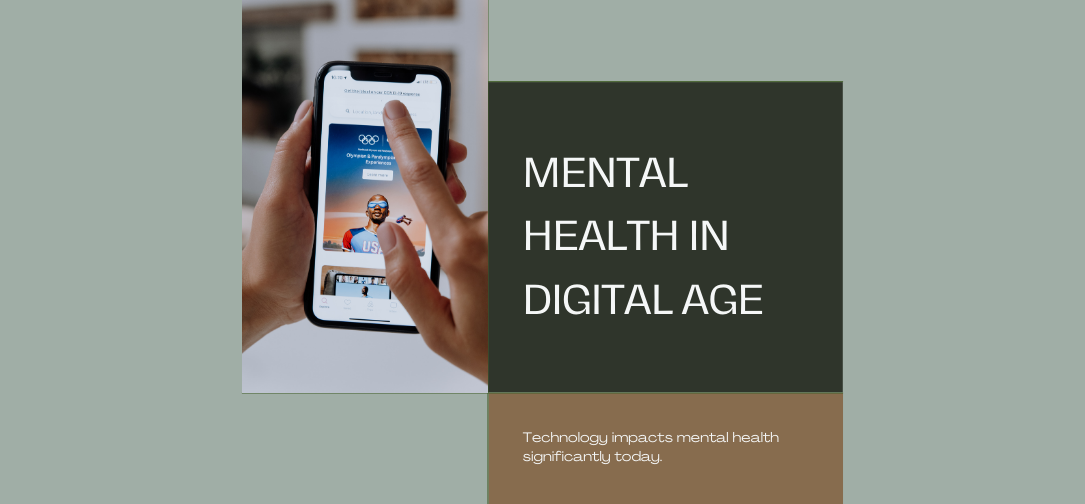
The relationship between technology and mental health is complex and multifaceted. On one hand, digital tools have revolutionized access to mental health care, providing valuable resources and support to those in need. On the other hand, the pervasive nature of technology has introduced new challenges that can exacerbate mental health disorders.
The Need for Digital Literacy and Mindful
From how we communicate to how we work, play, and even seek medical help, technology has profoundly altered our world. However, this rapid technological evolution has brought with it a host of challenges, particularly in the realm of mental health. As we become increasingly reliant on digital tools, the impact of technology on our mental well-being has become a topic of significant concern and research.
This article delves into the multifaceted relationship between technology and mental health, exploring both the positive contributions of digital advancements to mental health care and the potential risks associated with excessive or inappropriate use of technology. We will examine how social media, online gaming, screen time, and internet addiction are influencing mental health, and discuss the need for digital literacy and mindful usage of technology in the modern age.
The Positive Impact of Technology on Mental Health: Increased Access to Mental Health Services
One of the most significant benefits of digital technology is the democratization of mental health care. The advent of teletherapy and online counseling platforms has made mental health services more accessible than ever before. These platforms allow individuals to receive therapy remotely, breaking down barriers such as geographic location, mobility issues, and the stigma often associated with visiting a mental health professional.
During the COVID-19 pandemic, the demand for teletherapy surged, with platforms like BetterHelp and Talkspace reporting significant increases in user numbers. Research suggests that teletherapy is as effective as in-person therapy for many conditions, including depression and anxiety. A study published in the Journal of Affective Disorders found that patients who received online cognitive-behavioral therapy (CBT) experienced significant improvements in their symptoms, comparable to those who received traditional face-to-face therapy.
Mental Health Apps and Digital Interventions
Beyond teletherapy, the digital age has given rise to a plethora of mental health apps and online resources designed to support psychological well-being. These tools range from meditation apps like Headspace and Calm to cognitive-behavioral tools like Moodpath and Woebot, which offer users strategies to manage stress, anxiety, and depression.
A review published in JMIR mHealth and uHealth found that mental health apps can be effective in reducing symptoms of anxiety and depression, particularly when used as an adjunct to traditional therapy. The convenience of having mental health resources at one’s fingertips allows users to practice mindfulness, track their moods, and access therapeutic content anytime, anywhere.
Online Support Communities
The internet has also facilitated the creation of online support communities, which provide a platform for individuals to connect with others who share similar experiences. These communities offer emotional support, validation, and a sense of belonging, which can be particularly beneficial for individuals dealing with mental health challenges.
For example, platforms like Reddit, Facebook, and specialized mental health forums allow users to share their stories, seek advice, and offer support to others. Research published in Cyberpsychology, Behavior, and Social Networking found that participation in online mental health communities was associated with lower levels of psychological distress and higher levels of perceived social support. These findings highlight the potential of online communities to serve as valuable resources for those seeking connection and understanding.
The Dark Side of Technology: Negative Impacts on Mental Health
Despite the numerous benefits of digital technology, there is growing evidence that excessive or inappropriate use of these tools can have detrimental effects on mental health. The pervasive nature of technology has introduced new challenges, contributing to the rise of mental health disorders such as anxiety, depression, and internet addiction.
Social Media and Mental Health
Social media platforms like Facebook, Instagram, and Twitter have become integral to modern social interaction. While these platforms offer opportunities for connection and self-expression, they have also been linked to negative psychological outcomes.
The Comparison Trap
One of the most concerning aspects of social media is the tendency for users to engage in social comparison. Social media often presents an idealized version of reality, where users curate their lives to showcase success, beauty, and happiness. This can lead to feelings of inadequacy and low self-esteem among those who compare themselves to these idealized images.
A study published in Computers in Human Behavior found that individuals who engage in social comparison on social media are more likely to experience symptoms of depression and anxiety. The study highlighted that upward social comparison—comparing oneself to those perceived as more successful or attractive—can exacerbate negative mental health outcomes, particularly among young adults.
Cyberbullying and Online Harassment
The anonymity and reach of social media have also facilitated the rise of cyberbullying, a form of harassment that can have severe psychological consequences. Unlike traditional bullying, cyberbullying can occur at any time and be broadcast to a wide audience, making it particularly insidious.
Research published in JAMA Pediatrics found that victims of cyberbullying are more than twice as likely to experience suicidal thoughts compared to those who are not bullied. The study also found that the effects of cyberbullying were more pronounced than those of traditional bullying, likely due to the pervasive and public nature of online harassment.
Fear of Missing Out (FOMO)
Another negative consequence of social media use is the phenomenon known as the “fear of missing out” (FOMO). FOMO refers to the anxiety that arises from the perception that others are having more rewarding experiences than oneself. This fear can lead to compulsive checking of social media and a constant need for validation through likes and comments.
A study published in the Journal of Social and Clinical Psychology found that higher levels of FOMO were associated with increased symptoms of anxiety, depression, and loneliness. The study also suggested that limiting social media use can lead to significant reductions in these symptoms, highlighting the potential benefits of digital detox practices.
The Impact of Screen Time on Mental Health
The digital age has led to a significant increase in screen time, with individuals spending more time than ever in front of screens. This rise in screen time has raised concerns about its impact on mental health, particularly among children and adolescents.
Sleep Disruption
One of the most well-documented effects of excessive screen time is its impact on sleep. The blue light emitted by screens can interfere with the production of melatonin, the hormone that regulates sleep. This disruption can lead to difficulties falling asleep, reduced sleep quality, and insufficient sleep duration, all of which are linked to poorer mental health outcomes.
A study published in the Journal of Youth and Adolescence found that adolescents who reported higher levels of screen time, particularly before bed, were more likely to experience symptoms of depression and anxiety. The study emphasized the importance of promoting healthy screen habits, such as limiting screen use before bed, to protect mental health.
Attention and Cognitive Function
Excessive screen time has also been linked to impairments in attention and cognitive function. The constant exposure to digital stimuli can lead to difficulties in maintaining focus and processing information, particularly in younger individuals whose brains are still developing.
Research published in Psychological Science found that increased screen time was associated with lower scores on cognitive tests measuring attention and working memory. The study suggested that the rapid switching between tasks, which is common when using digital devices, may contribute to cognitive overload and reduced cognitive performance.
Online Gaming and Internet Addiction
The digital age has also seen the rise of online gaming, which has become a popular form of entertainment for people of all ages. While gaming can offer a sense of achievement and social connection, it can also lead to problematic behavior, particularly when it becomes addictive.
Gaming Disorder
In 2018, the World Health Organization (WHO) officially recognized gaming disorder as a mental health condition. Gaming disorder is characterized by a pattern of gaming behavior that is so severe that it takes precedence over other activities, leading to significant impairment in personal, social, and occupational functioning.
A study published in Addiction found that individuals with gaming disorder often experience high levels of depression, anxiety, and social isolation. The study also found that the disorder was more common among males and those with pre-existing mental health conditions, suggesting that certain individuals may be more vulnerable to developing problematic gaming behavior.
Internet Addiction
In addition to gaming disorder, the concept of internet addiction has gained attention in recent years. Internet addiction refers to excessive use of the internet that interferes with daily life, leading to negative consequences for mental health. Symptoms of internet addiction include preoccupation with online activities, withdrawal symptoms when not online, and an inability to control internet use.
Research published in Cyberpsychology, Behavior, and Social Networking found that internet addiction was associated with higher levels of depression, anxiety, and stress. The study also found that individuals with internet addiction were more likely to experience difficulties in relationships and work, highlighting the far-reaching impact of this condition on overall well-being.
The Double-Edged Sword of Technology in Mental Health
The relationship between technology and mental health is complex and multifaceted. On one hand, digital tools have revolutionized access to mental health care, providing valuable resources and support to those in need. On the other hand, the pervasive nature of technology has introduced new challenges that can exacerbate mental health disorders.
The Need for Digital Literacy and Mindful Usage
Given the dual nature of technology’s impact on mental health, it is essential to promote digital literacy and mindful usage of digital tools. Digital literacy involves understanding how to use technology effectively and responsibly, while mindful usage emphasizes the importance of being intentional and aware of how technology is impacting one’s mental health.
Promoting Healthy Digital Habits
To mitigate the negative effects of technology on mental health, individuals should be encouraged to develop healthy digital habits. This includes setting boundaries for screen time, taking regular breaks from digital devices, and engaging in activities that promote mental well-being, such as physical exercise, social interaction, and time spent in nature.
Educational initiatives that teach digital literacy skills, particularly to children and adolescents, can empower individuals to navigate the digital world in a way that supports their mental
To thoroughly explore the subject of mental health disorders in the digital age, it’s important to examine how the digital revolution has redefined our relationship with technology and, subsequently, our mental health. The proliferation of digital devices, social media platforms, and online interactions has created a double-edged sword one that offers incredible benefits but also significant challenges.
The Rise of Digital Technology
Digital technology has become an inseparable part of our daily lives. Smartphones, computers, and tablets are now as essential as traditional utilities like water and electricity. The average American spends over 10 hours a day on screens, with much of that time dedicated to work, communication, and entertainment. The widespread use of these devices has changed how we process information, interact with others, and even how we perceive ourselves.
Positive Impacts of Digital Technology on Mental Health
While the negative effects of technology on mental health often dominate discussions, it’s crucial to recognize the significant benefits as well. These positive aspects include improved access to mental health care, enhanced social support networks, and the availability of digital mental health tools.
Improved Access to Mental Health Care
One of the most significant advancements brought about by digital technology is the increased access to mental health services. Teletherapy and online counseling platforms have removed geographical and logistical barriers to treatment, making mental health care more accessible than ever before. According to a report by the American Psychological Association, teletherapy usage surged during the COVID-19 pandemic, with over 75% of psychologists reporting that they were delivering services remotely.
Platforms like BetterHelp and Talkspace have played a pivotal role in this transformation, providing a convenient and private way for individuals to seek therapy. Studies have shown that online therapy can be as effective as in-person therapy for conditions like depression and anxiety .
Digital Mental Health Tools
The availability of mental health apps and digital interventions has also expanded significantly. Apps like Headspace, Calm, and Moodpath offer tools for mindfulness, meditation, and mental health monitoring, providing users with immediate access to mental health resources. These tools are particularly beneficial for those who may not have access to traditional mental health care due to cost, stigma, or other barriers.
Research supports the effectiveness of these apps in reducing symptoms of anxiety and depression. For example, a study published in JMIR mHealth and uHealth found that users of mental health apps experienced significant improvements in their mental well-being, especially when these tools were used in conjunction with other forms of therapy .
Online Support Networks
The internet has also facilitated the creation of online communities where individuals can find support and share their experiences. These virtual spaces, whether they be forums, social media groups, or specialized mental health platforms, provide an outlet for people to connect with others who understand their struggles. This can be particularly important for those dealing with stigmatized or less understood mental health issues, offering them a sense of belonging and validation.
Negative Impacts of Digital Technology on Mental Health
Despite these benefits, the digital age has also introduced new challenges that can exacerbate mental health issues. These challenges include the pervasive nature of social media, the impact of screen time on well-being, and the potential for digital addiction.
Social Media and Mental Health
Social media platforms have revolutionized the way we communicate, but they have also been linked to various negative mental health outcomes. These platforms encourage constant social comparison, which can lead to feelings of inadequacy and low self-esteem, especially among young people.
The Comparison Trap
On platforms like Instagram and Facebook, users are often exposed to carefully curated images of success, beauty, and happiness. This can create unrealistic expectations and foster a sense of inadequacy among those who compare their lives to these idealized portrayals. Research has shown that frequent social comparison on social media is associated with increased symptoms of depression and anxiety .
Cyberbullying
Another significant issue related to social media is cyberbullying. Unlike traditional bullying, which is often limited to specific locations and times, cyberbullying can occur 24/7 and reach a wide audience, making it particularly harmful. Victims of cyberbullying often experience severe psychological distress, including depression, anxiety, and suicidal thoughts.
According to a study published in JAMA Pediatrics, victims of cyberbullying are more likely to experience suicidal ideation compared to those who are not bullied, highlighting the severe impact of this form of harassment .
Fear of Missing Out (FOMO)
Social media platforms also contribute to the phenomenon known as the “fear of missing out” (FOMO), which refers to the anxiety that arises when individuals believe they are missing out on rewarding experiences that others are enjoying. This fear can lead to compulsive checking of social media, which in turn exacerbates feelings of anxiety and dissatisfaction .
The Impact of Screen Time on Mental Health
The rise in screen time, driven by both work and leisure activities, has been linked to various mental health concerns. Excessive screen time has been associated with sleep disruption, reduced physical activity, and impaired cognitive function.
Sleep Disruption
Exposure to screens, especially before bedtime, can interfere with the body’s natural sleep-wake cycle. The blue light emitted by screens suppresses the production of melatonin, the hormone responsible for regulating sleep. This disruption can lead to insomnia and other sleep disorders, which are closely linked to mental health problems like depression and anxiety .
Cognitive and Attention Impairment
Excessive screen time has also been shown to impair attention and cognitive function, particularly in children and adolescents. The constant stimulation from screens can lead to difficulties in focusing and processing information, which can have long-term effects on cognitive development.
A study published in Psychological Science found that increased screen time was associated with lower cognitive test scores, suggesting that the overuse of digital devices may contribute to cognitive overload and decreased mental performance .
Digital Addiction
The rise of online gaming and social media has led to the emergence of new behavioral addictions, such as gaming disorder and internet addiction. These conditions are characterized by compulsive use of digital devices and activities, leading to significant impairment in daily life.
Gaming Disorder
The World Health Organization (WHO) officially recognized gaming disorder as a mental health condition in 2018. This disorder is characterized by a pattern of gaming behavior that takes precedence over other activities and leads to significant impairment in personal, social, and occupational functioning .
Individuals with gaming disorder often experience high levels of depression, anxiety, and social isolation. The disorder is particularly prevalent among young males and those with pre-existing mental health issues.
Internet Addiction
Internet addiction, while not yet recognized as an official diagnosis by the WHO, is increasingly being studied as a significant mental health concern. Symptoms include a preoccupation with online activities, withdrawal symptoms when not online, and an inability to control internet use. Research has linked internet addiction to higher levels of stress, anxiety, and depression .
Navigating the Digital Age: Strategies for Maintaining Mental Health
Given the dual nature of technology’s impact on mental health, it is crucial to adopt strategies that promote healthy digital habits while mitigating the risks associated with excessive use.
Digital Literacy and Mindful Usage
Digital literacy involves understanding how to use technology responsibly and effectively. This includes recognizing the potential risks associated with digital tools and being able to manage one’s digital consumption. Mindful usage, on the other hand, emphasizes being intentional about how and when we use technology, ensuring that it serves to enhance rather than detract from our mental well-being.
Setting Boundaries
One effective strategy for maintaining mental health in the digital age is setting boundaries for screen time. This can include establishing tech-free zones in the home, setting specific times for checking emails and social media, and taking regular breaks from screens. These practices can help reduce the negative impact of technology on sleep, attention, and overall mental health.
Promoting Healthy Online Behaviors
Encouraging positive online behaviors, such as fostering supportive digital communities and promoting kindness and empathy in online interactions, can help mitigate the risks of cyberbullying and social comparison. Educational initiatives that teach children and adolescents about the potential dangers of social media and the importance of responsible online behavior are also essential.
Conclusion
The digital age has brought about profound changes in the way we live, work, and interact with the world around us. While technology has the potential to greatly enhance our mental health by providing access to resources, support, and interventions, it also poses significant challenges that must be carefully managed. By promoting digital literacy, setting healthy boundaries, and encouraging mindful use of technology, we can navigate the digital landscape in a way that supports our mental well-being and mitigates the risks associated with excessive digital consumption. Understanding the complex relationship between technology and mental health is crucial as we continue to integrate digital tools into our daily lives. By recognizing both the benefits and the potential pitfalls, we can better equip ourselves to thrive in the digital age.

-

 Business4 days ago
Business4 days agoS&P 500 Soars in Best May in Decades Amid Tariff Relief and Nvidia’s Surge
-

 Healthcare6 days ago
Healthcare6 days agoAttention Economy Arms Race: Reclaim Your Focus in a World Designed to Distract You
-

 Immigration4 days ago
Immigration4 days agoTrump’s Immigration Crackdown: Legal Battles and Policy Shifts
-

 Government4 days ago
Government4 days agoTrump Administration’s Government Reshaping Efforts Face Criticism and Legal Battles
-

 Business4 days ago
Business4 days agoUS Stock Market Soars in May Amidst Tariff Tensions and Inflation Worries
-

 Business4 days ago
Business4 days agoTrump’s Tariffs: A Global Economic Reckoning
-

 Foreign Policy2 days ago
Foreign Policy2 days agoInside Schedule F: Will Trump’s Federal Workforce Shake-Up Undermine Democracy?
-

 Press Release1 day ago
Press Release1 day agoIn2space Launches Campaign to Make Space Travel Accessible for All

